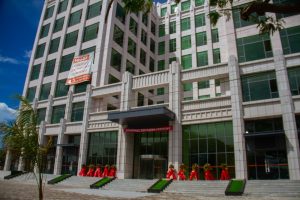TARI Dakawa Moves To Heighten Production Of Improved Rice Seeds Varieties
By
Valentine Oforo
TO
improve production and productivity in the country’s rice sector, the Tanzania
Agricultural Research Institute (TARI) in its Morogoro- based Dakawa Center is
running initiatives to produce more than 200 tons of new improved rice seeds
varieties.
Tanzania
leads in East Africa for rice production and the country stands at 4th position
in Africa, after Nigeria, Madagascar and Ivory Coast.
The
focus, among others, is to ensure that the crop’s growers from across the
country are timely equipped with enough, but improved seed varieties for the
vital socioeconomic crop.
Projects
for the production of the hybrid seeds varieties are currently being taking
place at the numerous rice-growing zones of the country, including Dakawa and
Ifakara (Morogoro), Mombo (Tanga) and Mbeya region, by participating a good
number of farmers, according to Dr Jerome Mghase, TARI Dakawa Manager.
Dr
Mghase unveiled that the new seed varieties, including TARI RIC 1, TARI RIC 2
and TARI RIC 3 are produced through the initiatives, observing that they’re
(the varieties) potential in terms of yielding capacity (around 7.5 per
hectare) and grain quality, among others.
“Introduction
and production of the key rice seeds varieties resulted from diverse research
we conducted in cooperation with like-minded stakeholders including the
International Rice Research Institute (IRRI),” he informed.
He noted that to a greater extent, the new
seeds will help the farmers involved in the sector to expand their production
and productivity, the sensible development which will fuel the general
performance in the country.
“We’re
also continuing to collaborate smoothly with other stakeholders to ensure the
country is equipped with enough improved rice seeds varieties,” he stated.
He
further went on to inform that the center was in a joint venture robust program
with IRRI to engage rice growers in Morogoro region to participate in research
activities and adoption of submergence rice seed technologies.
Among
others, he said the major focus behind the project was to elevate productivity
in production of the economic edible starchy cereal grain cash crop in the
country, added that through the timely initiative, most of the smallholder
farmers, agricultural extension workers, and agro-dealers have so far received
helpful training on submergence rice technologies.
“The
series of the training are tailored to provide a useful podium to help capture
innovative ideas from farmers in order to generate appropriate rice seed that
survives in flood environments. Also, the research wanted to build farmers’
confidence about the technology to be developed; own it hence its adoption once
the project excels, “he expressed.
In
more efforts to spur the performance of the economic sector, last year the
center in collaboration with the Zanzibar Agricultural Research Institute
(ZARI) conducted a special training on Mutation and Breeding (MB) to help speed
up rice breeding programs in the country.
During
2019/2020, the country produced 2.2 million tons and the focus, as per the
ministry of agriculture, is to heighten the production to at least 4.4 million
tons by 2030.
Tanzania’s
rice records show that at least 71 percent of rice is grown under rainfed
conditions with about half of the county’s rice grown by 239, 000 smallholder
farmers.
Rice
is grown in three major ecosystems in Tanzania, rainfed lowland, upland, and
irrigated systems. The area under rice increased from about 0.39 million
hectares in 1995 to about 0.72 million hectares by 2010.
Production
increased from about 0.62 million tons in 1995 to about 1.33 million tons of paddy
rice in 2009 but dropped to 1.10 million tons in 2010.
The
centre was established in 1984 by a joint effort of the government of the
United Republic of Tanzania and the Government of the Democratic Peoples’
Republic of Korea with a prime vision to become the rice centre of excellence
in the eastern, central and southern Africa region, whereby its mission is to
develop and disseminate results-based- research outputs on rice leading to
efficient and resilient farming systems.












